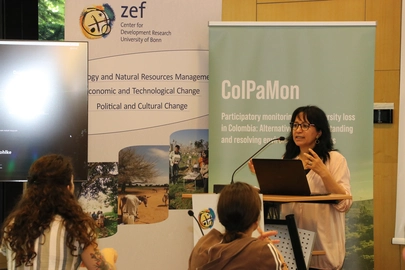Participatory monitoring of biodiversity loss in Colombia
August 22, 2022.
The ZEF-led German-Colombian bilateral Doctoral Studies Program DSSP has set a research project on “Participatory Monitoring of biodiversity loss in Colombia: Alternatives for understanding and resolving environmental conflicts” (acronym: ColPaMon)*).
Together with the Institute for Latin American Studies (LAI) at Freie Universität Berlin, (specifically the program trAndeS), ColMaPon has been promoting exchange spaces of community-based monitoring in conflicts since 2021. The project has not only been working in Colombia but has reached out to other Latin-American countries too. The main objective has been to explore alternatives and respond to environmental conflicts in Colombia while including and supporting local stakeholders in the process. Between May and November 2021, two workshops and three conferences took place, contributing to deepening monitoring experiences in different settings and territories of conflict. Through this kind of interaction it was possible to generate knowledge about participative and community-based monitoring processes and engage local communities that have developed different monitoring processes of environmental conflicts.
Exchange, assessment and looking forward: Workshop in Bonn
Following-up on its previous agenda and actions, ColPaMon organized its third (hybrid) workshop at ZEF from June 21-23, 2022, bringing together a diverse group of participants from Colombia, Ghana and Germany. The workshop aimed at facilitating further exchange about current participatory monitoring initiatives on environmental conflicts in Colombia and Germany. Another objecive of the three-day workshop (see full program here) was to share and discuss scientific questions and thereby work on a full project (collaboration) proposal for enhancing participatory monitoring of environmental conflicts in Colombia.
Environmental activism and policy in Germany
The workshop participants in Bonn shared insights about Environmental Conflicts and Participatory Monitoring in different scenarios and contexts. Among the presenters was Daniel Hofinger, a spokesperson of the German environmentalist and anti-coalmining initiative “Ende Gelände”. His presentation was followed by a discussion on the role of activism in Germany and an interesting exchange about the sometimes diverging perspectives of civil society and academia.
Furthermore, there were presentations on information and data management systems such as the Environmental Information System and the Observatory of Environmental Conflicts, both developed in IDEA within DSSP. Based on this, ideas for a future collaboration project that would involve techniques and technologies in participatory monitoring of environmental conflicts in Colombia were discussed.
A special guest was Kerstin Sieverdingbeck, the policy adviser for Colombia with the German Federal Ministry for Economic Cooperation and Development (BMZ). Ms. Sieverdingbeck explained the framework of BMZ-related cooperation with Colombia, presented some of the BMZ-instruments to address environmental conflicts, and talked about the prospects of international cooperation as well as the main challenges BMZ has been facing in these multiple processes.
The first workshop day concluded with a World-Café with different working groups on the preliminary research questions of the envisaged collaboration proposal. Discussion points were conceptualizations integrating perspectives of the Global North and the Global South; innovative theories and methodologies of transdisciplinary research; and the articulation of scientific and local knowledge to face conflicts. The sessions were moderated by doctoral students of this year’s DSSP Summer School (You can watch video interviews with the DSSP students from Colombia here).
Different regional perspectives
During the followig days, there were insightful presentations from different regions; ZEF senior-researcher Dennis Avilés from Bolivia shared information and first results from a research project (called IRASAG), which looks into social and gender transformations linked to fire events in the Amazon Region. ZEF alumnus Asaah Mohammed (now at C. K. Tedam University of Technology and Applied Science in Navrongo, Ghana and the University for Development Studies in Tamale, Ghana) talked about institutional arrangement for governance and local benefit sharing in Ghana’s oil sector. Jonas Hein from the German Institute of Development and Sustainability (IDOS) gave a talk about the ongoing conflict over the Elbe Estuary and different narratives about water from a political ecology perspective. Carlos Nupia from the German Colombian Peace Institute (CAPAZ) reflected on conflict, environment and academic international cooperation. ZEF-alumnus Alejandro Mora-Motta presented a recently accepted paper, written with different colleagues from ZEF, on “Integrating scientific and local knowledge to address environmental conflicts: the role of academia”.
After two and a half interesting and intensive working days inside, the workshop ended with an excursion to the Siebengebirge, a Natural Reserve near Bonn. All participants had the opportunity to visit this beautiful place, learn about this area’s special natural resources management and its importance for climate regulation and biodiversity, and just enjoy the peace and beauty of this natural space.
*) The ColPaMon project is an initiative emerging from the Doctoral Studies Support Program (DSSP), a bilateral graduate school run by ZEF, University of Bonn, the Institute for Environmental Studies (IDEA) of the National University of Colombia (UNAL).
Funding: German Academic Exchange Service (DAAD).
Author: Carolina Tobón-Ramírez is a junior researcher at ZEF/DSSP; ctobonr@unal.edu.co



